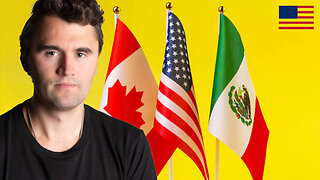Premium Only Content

(Mirror) Prominent Anarchist Intellectuals & Their Contributions to Anarchism: Explained
Originally uploaded by Las Armas Ⓐ:
https://www.youtube.com/watch?v=7JUcS8okxMM
Prominent Anarchist Intellectuals & Their Contributions to Anarchism: Explained
Pierre-Joseph Proudhon was a French philosopher and economist who is considered one of the founding fathers of anarchism. His ideas are characterized by a critique of private property and a call for a society based on voluntarism, mutualism, and federation.
Proudhon's main principle was "property is theft." He argued that all property beyond what one needs for their subsistence is theft from the community. This idea led to his proposal for a system of mutualism, in which workers control the means of production and exchange goods and services without the interference of the state or capitalists. This would lead to a fair distribution of wealth and resources among individuals.
Proudhon also believed in self-governance and opposed all forms of government and authority. He proposed a system of federations, where local communities and workplaces would voluntarily associate with one another, with no hierarchy or central authority. This would allow for a decentralized society, where individuals would have control over their own lives and decisions.
--
Pyotr Kropotkin was a Russian revolutionary and philosopher, who developed the theory of Anarchism. He believed that Anarchism was the highest form of social and political organization, which prioritized the freedom and autonomy of individuals, and the abolition of all forms of hierarchy and oppression. In Kropotkin's view, society could only be truly liberated if individuals were empowered to govern themselves, without the need for state control or a ruling elite.
Kropotkin's Anarchism emphasized the importance of mutual aid and cooperation as key principles of social organization. He believed that humans are naturally cooperative creatures, and that through solidarity and community work, people could create a society based on equality and freedom. Kropotkin also rejected the dominant economic model of capitalism, arguing that it inevitably leads to inequality and exploitation, and that anarchism provides an alternative model based on collective ownership and control of resources.
One of Kropotkin's most famous works is "The Conquest of Bread," where he explored the possibility of creating a society based on mutual aid, voluntary cooperation, and free association. The book details a vision of a world where people share resources freely, and where work is mutually organized and agreed upon. Kropotkin argued that such a world was not only possible but necessary, and that anarchism provided the framework for achieving it.
-
Emma Goldman was a famous anarchist and feminist philosopher who lived from 1869 to 1940. Her philosophy was characterized by her radical and often controversial views on social, political, and economic issues of the time, which she expressed through her writings, speeches, and activism.
One of the central themes in Goldman's philosophy is the rejection of authority and traditional hierarchies. She believed that all individuals should have autonomy and control over their own lives, without being subjected to the arbitrary will of institutions or rulers. This led her to advocate for the decentralization of power and the dismantling of governments and other centralized structures.
Another important aspect of Goldman's philosophy was her emphasis on individual freedom and the right to self-expression. She believed that people should be allowed to live their lives as they saw fit, without interference from society, religion, or other sources of external control. This led her to champion a variety of causes, including free speech, birth control, and the fight against censorship and censorship laws.
Despite her radical views, Goldman was a deeply compassionate thinker, and her philosophy reflected a genuine concern for the wellbeing of people and communities. She believed that a society built on mutual respect, cooperation, and solidarity would be more just and equitable than one based on competition and individualism.
Overall, Goldman's philosophy was characterized by an uncompromising commitment to liberty, equality, and social justice, and her insights continue to be relevant and influential today.
-
Bakunin's contributions to anarchism were significant, including:
The concept of collectivism - Bakunin proposed that individuals should work together in collectives to achieve their goals and ensure their own freedom. He believed that collective action was necessary to overthrow oppressive systems like capitalism and the state.
The rejection of Marxism - Bakunin argued that Marx's idea of a dictatorship of the proletariat would simply replace one oppressive system with another. He believed that any form of dictatorship was incompatible with true freedom.
-
 LIVE
LIVE
In The Litter Box w/ Jewels & Catturd
22 hours ago1 TRILLION! | In the Litter Box w/ Jewels & Catturd – Ep. 733 – 2/3/2025
7,823 watching -
 1:38:44
1:38:44
The Quartering
2 hours agoTrump's Tariffs Already Work, Blackhawk Pilot Coverup, DNC Makes Insane David Hogg Appointment
43K22 -
 LIVE
LIVE
Dr Disrespect
4 hours ago🔴LIVE - DR DISRESPECT - TARKOV - ZERO TO HERO RAIDS ONLY
4,211 watching -
 1:13:51
1:13:51
Candace Show Podcast
2 hours agoEXCLUSIVE! Did Ryan Reynolds Extort Hollywood Execs? | Candace Ep 143
45K40 -
 LIVE
LIVE
Darkhorse Podcast
3 hours agoThe 263rd Evolutionary Lens with Bret Weinstein and Heather Heying
909 watching -
 9:37
9:37
Silver Dragons
2 hours agoGoodbye Cheap Silver - How the Tariffs Will Change Stacking Forever
2.21K -
 37:33
37:33
CryptoWendyO
2 hours ago $0.47 earnedWORST DAY IN CRYPTO HISTORY $10 Billion in Liquidations!
5.65K4 -
 57:01
57:01
PMG
2 hours agoHannah Faulkner and Dr. Bryan Ardis | Don't Fall For the Bird Flu!!!
5.99K -
 1:18:00
1:18:00
Russell Brand
1 day agoUFOs, Whistleblowers, and Government Lies – The Truth with Jeremy Corbell – SF530
174K58 -
 1:57:47
1:57:47
The Charlie Kirk Show
3 hours agoThe Most Beautiful Word in English + Confirm Tulsi! | Navarro, McCain, Posobiec | 2.3.2025
169K41